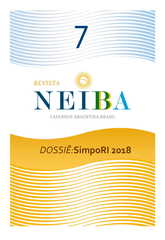The Metaphor of "War on Drugs" and "Mass Murder" in the Philippines: discourse analysis, power relations, and an interview with President Rodrigo Duterte
DOI:
https://doi.org/10.12957/neiba.2018.42489Palavras-chave:
War on Drugs, (In)Security Discourses, Extrajudicial Killing, PhilippinesResumo
This article offers an analysis of statements pronounced by Rodrigo Duterte in an interview produced by Al Jazeera. It shows how Duterte tried to legitimize the extrajudicial killing of more than 3.500 citizens through these statements and rhetoric, a discourse dependent and effective through the metaphor of “war on drugs”, constructing drug dealers and users as threats, enemies to be “legitimately” killed. Drawing on Foucault's Discourse Analysis (1971), it argues that although war on drugs is a metaphor, and not war in the literal or modern sense, it is mobilized within a discursive strategy previous to, during, and after presidential elections; it is a juridical-political discourse on drugs and security that results in confrontations, hunting, punishment, and, in the limit, the exclusion or extermination of declared enemies. It also delineates the electoral context and the historical level of analysis, discussing the role of discourse analysis for critical security studies.
Downloads
Publicado
Como Citar
Edição
Seção
Licença
Os Direitos Autorais dos artigos publicados na Revista Neiba, Cadernos Argentina-Brasil pertencem ao(s) seu(s) respectivo(s) autor(es), com os direitos de primeira publicação cedidos à Revista Neiba, Cadernos Argentina-Brasil, com o trabalho simultaneamente licenciado sob uma Licença Creative Commons Atribuição, a qual permite o compartilhamento do trabalho com reconhecimento da autoria e publicação inicial nesta revista. Em virtude de aparecerem na Revista Neiba, Cadernos Argentina-Brasil, o material criado por você pode ser distribuído, copiado e exibido por terceiros. O trabalho original deve ser citado e apresentar um link para o artigo disponível no site da revista em que foi publicado, de acordo com os termos da Licença Creative Commons Atribuição 4.0 Internacional adotado por esta Revista.
This work is licensed under a Creative Commons Attribution 4.0 International License





